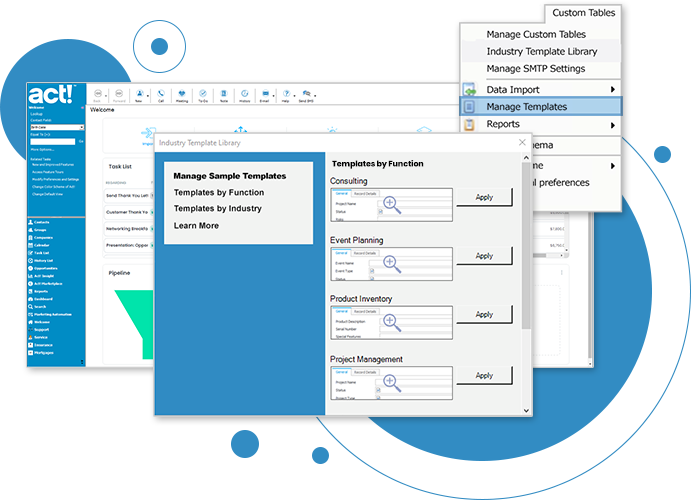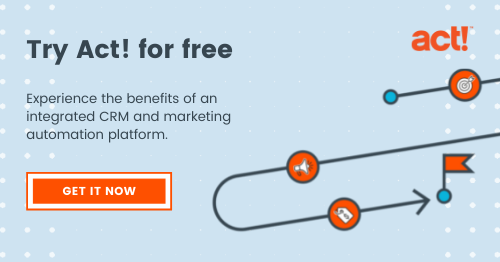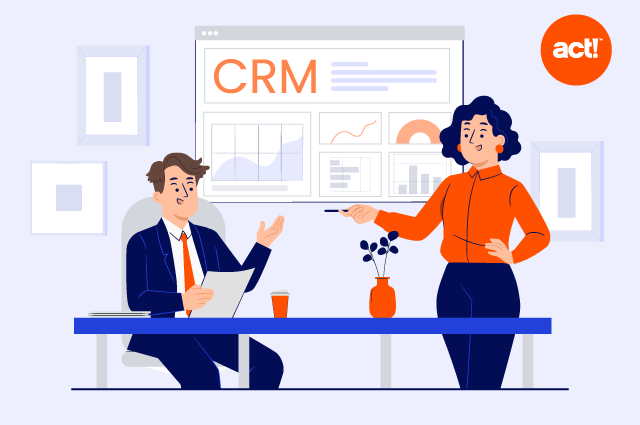
Whether you’re running a global corporation or a bootstrapped startup, the right CRM (customer relationship management) platform can help you acquire and retain customers. It also lets you implement workflows to automate routine tasks, such as following up with an active lead or sending subscription renewal reminders in real-time.
But how do you maximise the gains from your CRM workflows? While there’s no one-size-fits-all answer to that question, one effective solution is using CRM templates.
When it comes to CRMs, you can use a wide array of templates for contacts, social media posts, documents, emails, and more. Judicious use of these templates can be instrumental in improving your business processes and maximizing time and cost savings.
In this article, we’ll take a closer look at why templates are indispensable to your CRM workflows.
What are CRM templates?

“CRM templates” is an umbrella term for pre-built or pre-formatted resources that streamline customer interactions and workflow management. You can easily customise these templates according to your preferences and requirements. They’re useful for various departments, from marketing and sales to customer service.
Today’s CRM platforms let you use a wide array of templates to create and deploy sales workflows. For instance, Act!CRM, which includes marketing automation, provides you with pre-designed email templates to implement automated drip campaigns for lead nurturing. They save you the trouble of designing attractive emails from scratch. Similarly, you can use templates to create crucial documents to manage relevant information, such as contracts, invoices, and proposals.
Many CRMs also let you use templates to store and manage customer data. For instance, Act! Custom Tables includes pre-built templates for various industries, including real estate, software, consulting, and insurance, eliminating the need to create and customise spreadsheet-like tables without additional development resources.
Besides CRM email templates and contact templates, you can also leverage templates for content development, funnel creation, and customer feedback surveys to meet your business needs. It’s also possible to create and customise templates for customer notifications and reminders.
Benefits of using templates for CRM workflow management
Templates come in handy, whether you’re looking to build a lead-nurturing funnel or improve your customer onboarding workflow. If you’re wondering whether to use them in your CRM workflows, here are a few benefits worth considering.
Increased productivity and efficiency
CRM templates help various departments save time and resources. For instance, sales team members can build a template for customer acquisition to streamline the workflow. Once the template is ready, they can use it every time a new prospect enters the funnel.
Relying on templates eliminates guesswork from the process and helps sales reps make the right decisions without delays. At the same time, they can tailor the template according to each customer’s preferences and pain points to deliver a better experience.
Similarly, marketing and sales teams can use email templates to minimise the time they spend creating emails. That time can be put to better use, such as monitoring open rates, click-through rates, and other campaign performance metrics.
In a nutshell, templates skyrocket the efficiency of your CRM workflows and help you achieve more goals faster. This can be a blessing for small businesses that already face several constraints.
Consistent branding
When you use templates and manage customer interactions via a CRM app, it minimises the room for errors and inconsistencies.
For instance, you can pre-approve email templates for appointment reminders. Sales reps will only need to edit the template by adding a customer’s name and date and time of appointment. Design elements, such as the color, size, font style, and placement of calls-to-action (CTAs), remain fixed. Similarly, there are no changes in the language and tone of the email.
You can even ensure that key elements of your brand identity, such as the company logo and website URL, are added to every email. This lets you create a consistent brand identity, which wouldn’t have been possible if every sales rep had created their own version of appointment reminders. It’s particularly helpful for new team members who are yet to get a grip on your branding.
Enhanced automation
One of the key advantages of using a CRM system is that it helps you streamline the sales process by automating routine tasks. And templates help you harness the full potential of workflow automation.
Let’s say you’re looking to build an automated sales funnel. With a pre-built workflow template, you can easily define the exact sequence of touchpoints a prospect will encounter through every stage of their buying journey.
Also, you can automatically assign tasks to relevant sales reps whenever a lead enters the funnel or moves from one stage to the next. You can even send email reminders to ensure they connect with the lead and guide them through various touchpoints.
Once you’ve built the workflow template, you can use it to automate the sales funnel over and over again. This results in time and cost savings and drives efficiency further.
Guaranteed scalability
As your small business grows, marketers must implement more marketing campaigns, and sales teams must manage more customer interactions. Simultaneously, the volume of customer support tickets will also see a surge.
CRM templates can be the key to managing these growing demands at scale. You can easily reuse workflow templates to replicate their success and improve conversion rates.
Additionally, you can use templates to standardise various customer interactions while minimizing human errors. This can help you provide a consistent brand experience to your prospects and customers at scale.
Improved customer experience
With templates, you can offer a seamless purchasing journey for every customer. Automated workflows and standardised customer interactions eliminate human errors. Additionally, you can customise workflow templates to delight customers with personalised communication and product recommendations.
It’s also worth noting that when customer-facing teams use CRM templates, they can avoid getting caught up in routine tasks. Instead, they can focus on more important jobs, such as identifying and removing points of friction from the buying journey.
This results in a consistent and frictionless customer experience. Ultimately, it helps convert more leads into paying customers and generate greater revenue through on-point upsells and cross-sells.
Legal and regulatory compliance
Certain sectors, such as financial services and insurance, enforce strict laws and regulations when it comes to interacting with consumers. Using pre-approved templates for emails, SMS messages, push notifications, and other communication channels, you can reduce the likelihood of non-compliance. This can be instrumental in helping you avoid legal hassles down the line.
Harness the full benefits of CRM workflows with templates
CRM templates offer a wide array of benefits, including improved efficiency, productivity, and scalability. When used properly, they can also help you automate workflows more easily, maintain consistent brand identity, and take the customer experience up a notch. Plus, they standardise customer-facing interactions and processes and help avoid compliance-related challenges.
Act! offers all the key features you look for in a modern-day CRM solution, including pre-built templates.
Start your free trial today to see our platform in action and find out whether it’s the right fit for your business. No credit card or download is required.






